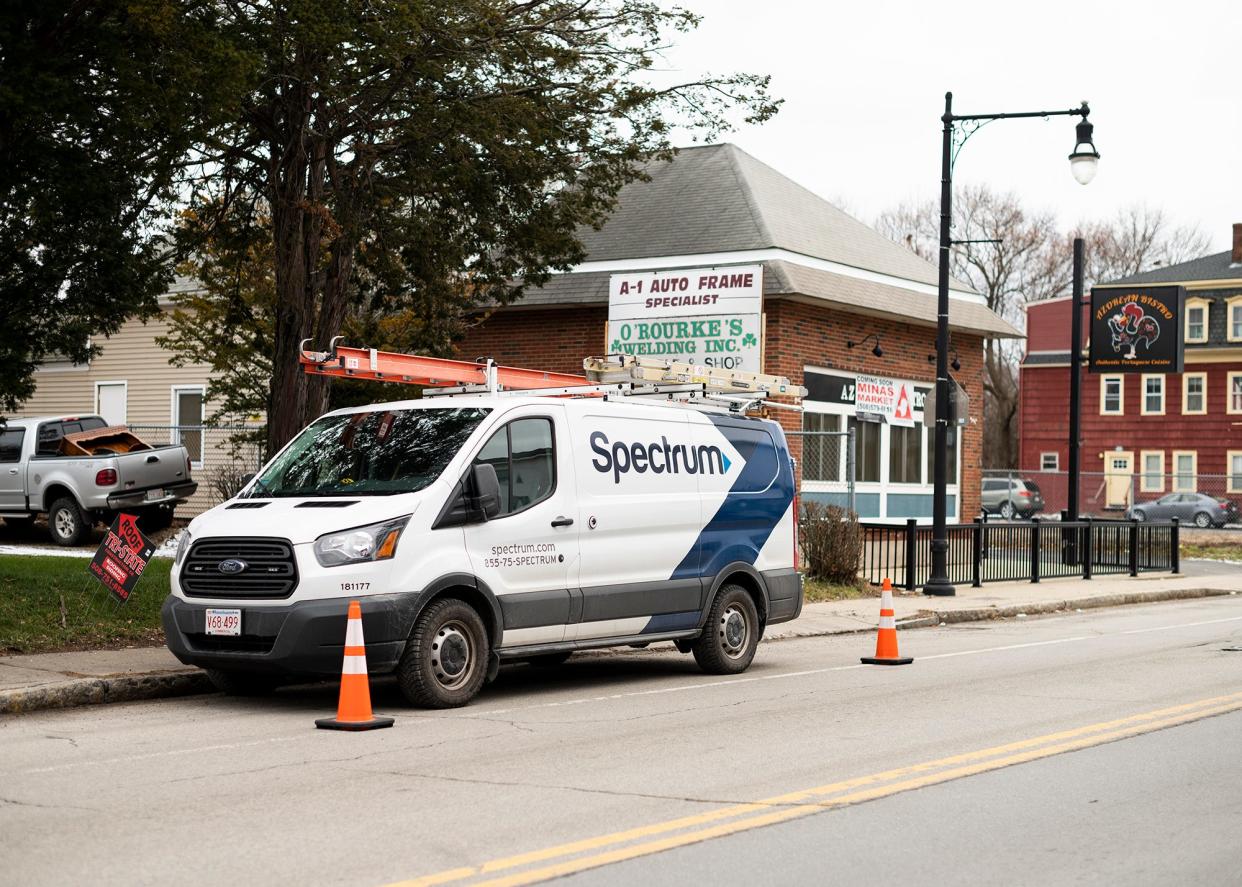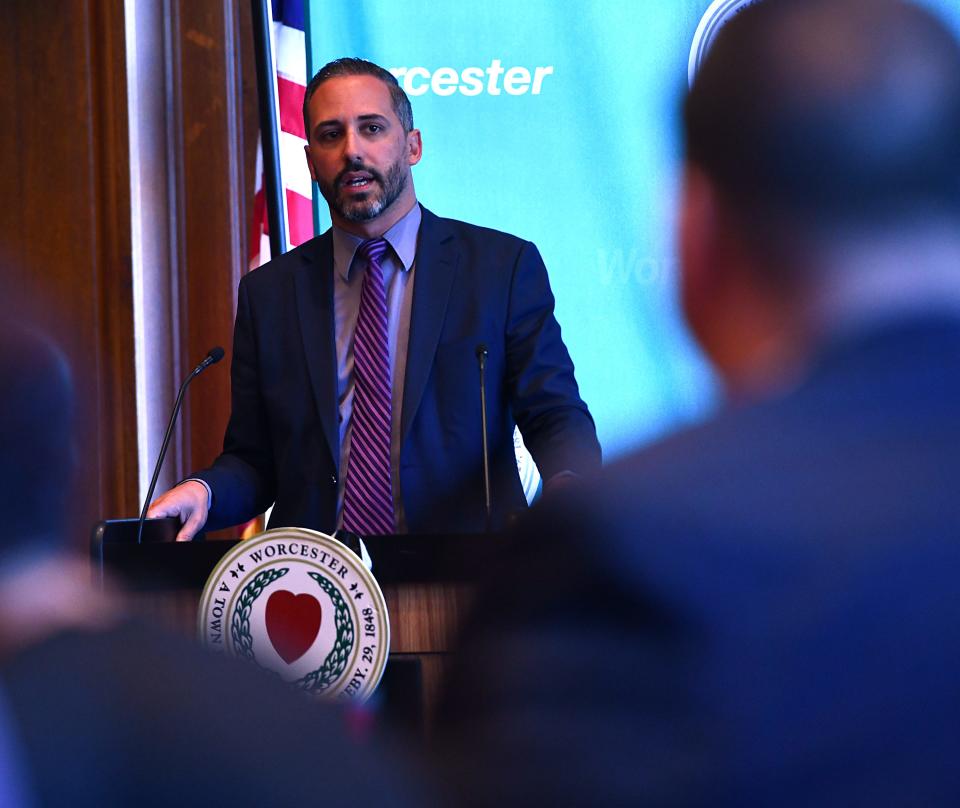Batista, cable advisory panel at odds over renewing Worcester's contract with Spectrum

WORCESTER ― There is disagreement over the levers of power in Worcester when it comes to the city’s cable contract with Spectrum.
To highlight the division, John Keough, chairman of the city’s Cable Television Advisory Committee, said he filed an order Monday with the city clerk. The filing asked the City Council to take a position on the advisory committee’s unanimous recommendation in March that the city not renew its 10-year contract with Spectrum.
The recommendation is based on the committee’s belief that Spectrum falls woefully short of delivering the services promised in the contract.
The order would apply to next week’s City Council meeting. Keough conceded the council doesn't have the authority to decide the city’s cable deal, but the advisory committee wants the council’s position on the record.
It comes as City Manager Eric D. Batista stated in his May 1 blog, The Buzz with City Manager Eric Batista, that despite the advisory committee’s recommendation, the city is currently in a renewal process with Spectrum relative to its license agreement to provide cable television services in Worcester.
"I appreciate the work of the advisory committee and their recommendations when it comes to the license agreement. However in addition to their recommendations, I must consider the options the city has, as well as federal and state regulations when it comes to cable providers," Batista wrote.
The city declined a request for an interview with Batista on current talks with Spectrum. A city spokesman said Batista can’t speak on specifics of the ongoing negotiations and referred all questions about the license agreement to the blog.
Advisory committee put in the work
Keough is outraged because the advisory committee's recommendation comes after years of public hearings and surveys that showed widespread customer dissatisfaction with Spectrum. Advisory committee members are volunteers, appointed by the city manager.
“Universally, not a single resident at the public hearings or in the surveys said Spectrum treated them well,” said Keough. “Spectrum are poor partners and never treated the city well.”
The committee also spent city funds to hire a consultant, The Buske Group, to investigate whether Spectrum adhered to the contract's terms. Lawyer Gerard Lederer, a specialist in telecommunications and cable law, was also hired by the advisory committee, at taxpayer expense, to review the contract.
Keough said it was all done to give Batista the tools to make the best decision for the city’s cable subscribers.
Could payment shift to streaming companies?
Meanwhile, a pending bill made it out of a state legislative committee Monday that could change the landscape. It would shift the burden of paying for public, education and government access channels from cable TV subscribers to streaming companies that do business in Massachusetts.
Currently in Worcester, 5% of Spectrum's gross revenue it gets from city cable subscribers is returned to Worcester to fund its cable office and PEG channels.
The Legislature's Joint Committee on Advance Information Technology, the Internet and Cybersecurity recommended that lawmakers in the House and Senate consider supporting the bill. It now goes to Ways and Means in both branches for further study before it can come to a floor vote.
State Sen. Michael O. Moore, D-Millbury, the Senate co-chairman of the joint committee, said the bill originally proposed streaming companies doing business in Massachusetts return 5% of gross revenues to pay for PEG channels in cities and towns statewide.
However, the joint committee determined 5% could generate significantly more cash than needed. The bill wasn't intended to add revenue to the state's general fund, according to Moore.
So the joint committee formed a five-member commission to study what the appropriate percentage should be. The commission is expected to meet annually and whatever percentage it ultimately decided on, the number could be increased or cut annually, depending on market conditions.
Those with seats on the commission include the commissioner of the Massachusetts Department of Telecommunications and Cable or a designee, commissioner of the state Department of Revenue, the state commissioner of rural affairs, the president of Massachusetts Community Media Inc. and the president of New England Connectivity and Telecommunications Association.
'None are correct'
Keough strongly disagreed with points raised in Batista's blog for negotiating a new contract with Spectrum.
“None of (Batista’s) points are correct. All are completely false,” said Keough.
The blog stated that Spectrum doesn’t have exclusive rights in Worcester and another company could come in to provide cable services. However, that company would need to purchase Spectrum’s existing cable network or build its own.
An unlikely scenario for a company’s bottom line, according to the blog, because the industry is moving away from cable to streaming services.
Keough challenged this line of thinking. He said state law makes it illegal for another company to build a new system of utility poles and wires. Besides, Keough said, the poles are routinely shared with other telecommunications companies, making the construction of new poles unnecessary. In addition, the existing poles are owned by the city and can’t be transferred to other companies without the city’s permission, according to Keough.

Batista’s blog also claimed that denying Spectrum’s license would result in protracted legal proceedings. Even if the city won in court, the blog said, residents would be left with no cable provider. Plus, there would be no funding for cable services and PEG channels that help keep residents informed about local issues.
Keough disputed that premise, noting that denying license renewal forces a company to come to the negotiating table. He cited the recent example in Springfield. That city, the third-largest in Massachusetts, agreed to a new 10-year license agreement with cable provider Comcast in February 2022. It happened two months after Mayor Domenic Sarno sent Comcast a nonrenewal letter.
Batista noted in his blog that the city can negotiate funding for PEG access channels and cable services. However, it can't negotiate what Spectrum charges customers and programming, as the federal government deregulated those aspects.
Four swings, four misses
Four areas legally set by the Federal Communications Commission determine if a city or town can start the formal process for nonrenewal of an existing cable license, according to Keough. Spectrum failed all four, he said.
One is meeting a community’s needs, and Keough said Spectrum violated it by unilaterally moving PEG channels to a new spot on the dial without informing customers beforehand.
Another factor is financial. Many of Spectrum’s payments to Worcester have been late, said Keough.
Third, some infrastructure improvements mandated in the contract haven’t been made, according to Keough. They include failure to make upgrades in PEG channel connections at City Hall, Worcester Technical High School and WCCA TV.
Finally, customer service requirements in the contract have “completely failed,” said Keough. Customers are supposed to get their bills 15 days before the due date, but it often doesn't happen. The advisory committees has copies of bills from customers, Keough said, that show arrival on the 30th of the month, one day before payment is due.
In addition, calls to customer service representatives are supposed to be answered by a human within 30 seconds.
“That’s never happened in the 11 years of the contract,” said Keough.
No advance notice
What burns Keough, he said, is that Batista went public with his blog without first telling the advisory committee that he planned to negotiate a new deal with Spectrum.
“It’s typical of city administration,” said Keough. “They asked volunteers for services and we work hard. This has been a consistent thing since (former City Manager) Mike O’Brien. Volunteers on committees are consistently disrespected.”
Keough also noted that Worcester has never demanded an audit of Spectrum’s contract with the city, even though the franchise agreement allows it, at Spectrum’s expense. He also questions whether city administration has the expertise to negotiate complicated cable deals.
Cable business is challenged
Besides, the writing is on the wall, said Keough, that the cable business model is dying. Streaming is quickly taking its market share and Keough provided numbers to prove his point. In October 2023, when Spectrum’s 10-year contract was extended for one year, the company had an estimated 23,000 subscribers, compared to 48,000 in 2013.
Meanwhile, Spectrum’s payments to Worcester fell from $2.07 million in 2013 to $1.97 million in 2023. The drop would have been higher if not for Spectrum hiking subscriber fees. Keough noted the company is legally allowed to increase fees once a year, but did it three times in 2023.
This is likely the last cable contract the city will negotiate, said Keough, because subscribers are migrating in droves to streaming services. Given that picture, Keough wonders why Batista isn't exploring legal options the city is entitled to in order to get a better deal with Spectrum.
"(Batista) will not fight for the people of Worcester," said Keough. "He would rather give Spectrum what they want rather than help his constituents and citizens. It makes no sense."
Contact Henry Schwan at henry.schwan@telegram.com. Follow him on X: @henrytelegram.
This article originally appeared on Telegram & Gazette: Spectrum in Worcester: Batista and advisory panel at odds on renewal

